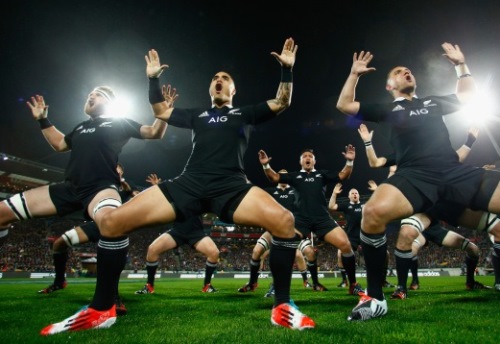
All Blacks Haka
The All Blacks second defeat in 44 Test matches was met with mixed reaction throughout the rugby world, not enough to prevent New Zealand from claiming The Rugby Championship, but it did stop a tournament whitewash for the third straight season.
Generally Kiwis did not panic, the consistency of Steve Hansen’s results deservedly have built up some emotional credit.
Some quarters of the media almost ridiculously hailed it as the beginning of the end for the World Champions, most were restrained wary to feed the wounded beast.
The All Blacks finished first overall, winning their 13th title since 1996, winning four Tests, drawing one and losing their final match – which was their first tournament defeat in 18 fixtures.
sanzarrugby
First hint, ever so slight, of weakness

This All Blacks team over the years has carefully built up a tightly guarded tactical portfolio, eliminating weaknesses like a susceptibility to a kicking game, while building an impressive defensive and mental arsenal.
Yet the Springboks did the rugby planet a few favours over The Rugby Championship.
They proved that dominating the contact area, not specifically when tackling but when attacking the breakdown, can disrupt a team that sometimes gets caught short with the likes of Kieran Read and Brodie Retallick marauding around the loose.
New Zealand finished fourth overall with the worst ruck retention percentage (92).
Selections also seemed to hint towards specific picks to counter the All Blacks, Tebo Mohoje’s inclusion ensured that the utility forward, with experience at blindside and lock, gave power and speed to the Boks ruck offensive.
Yet it was how the All Blacks looked caught off guard when the Springboks played like their great rivals, running the ball venomously from deep that proved there is no impenetrable armour draped around the world’s best side.
While Hansen and co will work to eliminate such astonishment again, for the second time since the former policeman took over his team was well beaten by a side that employed a high risk high reward running game.
Who to build the team around?

In 2013 a core part of the All Blacks game revolved around Kieran Read’s destructive yet delicate impact around the fringes, while Ma’a Nonu – a compelling attraction for the defence and one of the great operators moving forward in tight traffic – has contributed to a re-write of what the team seeks from their second five-eighth.
Malakai Fekitoa, despite similarities to Nonu, offers alternatives; while New Zealand’s back row has been impressive, Read, Richie McCaw, Jerome Kaino, Steven Luatua and Liam Messam at no point bossed a contest.
A bit like Duane Vermeulen did.
Other changes show that Aaron Smith’s passing game, a massive part of their 2013 arsenal, has been embellished with a heavier lean towards kicking, which might improve his team’s options, but last year’s perseverance towards clearing the ball from the ruck with blinding speed did pay handsome dividends.
Retallick’s brutal game has been a focal point and oh what difference the form second row forward in the the world could have made at Ellis Park.
There aren’t many All Blacks out of form, but there are not many currently completely dominating with every moment they get involved, think Ben Smith earlier in the season.
Depth will be pleasing

Losses, broken streaks and retained trophies aside, it is pretty obvious that the All Blacks have the best depth of any Test nation, even though to be fair all teams throughout The Rugby Championship boasted impressive squads.
There is little doubt that the absence of certain players does alter the dynamic of the World Champions – but loosehead prop, lock, first five-eighth and the back three have emerged as stacked areas.
Hooker could be added to this with Nathan Harris’ workmanlike debut and Keven Mealamu’s sheer bloody mindedness (not to mention Dane Coles continued rise), while even Conrad Smith the premier 13 could be replaced.
Nonu, Fekitoa, Sonny Bill Williams and Ryan Crotty would all be handy at centre.
Thank you card to Argentina?

There are a few lessons that history backs to the hilt when it comes to Rugby World Cups.
Massively experienced squads are one necessity, form is rarely relevant leading into the quadrennial tournament, while any team that emerges from a soft pool is often in trouble irrespective of their pedigree.
For all the planning that has been going on with New Zealand Rugby determined to create history and go back-to-back for the first time in Rugby World Cup folklore, a ‘soft’ group was a big worry.
Not anymore.
Argentina’s feats during the 2014 edition of The Rugby Championship, a Pool C team next year alongside the All Blacks, will make sure the Webb Ellis holders undertake a thorough examination at Wembley Stadium on September 20.
Tough part starts now…

Next up for the All Blacks is the Wallabies at Suncorp Stadium, a dreaded ‘dead rubber’ if there ever was one.
Put away the tarot cards but if Australia was to record their first win over New Zealand in ten Tests, it would be the first time since August 2011 (just before the World Cup) that the men in black have lost two internationals on the trot.
Losing to the Springboks in Ellis Park in a nail biting classic is one thing, but one of the hallmarks of Hansen’s tenure has been how quickly they learn and eradicate mistakes, so one suspects tolerance will be minimal if not non-existent were the unthinkable to happen in Brisbane.
And then comes Chicago, Europe, and then the nine month countdown begins.